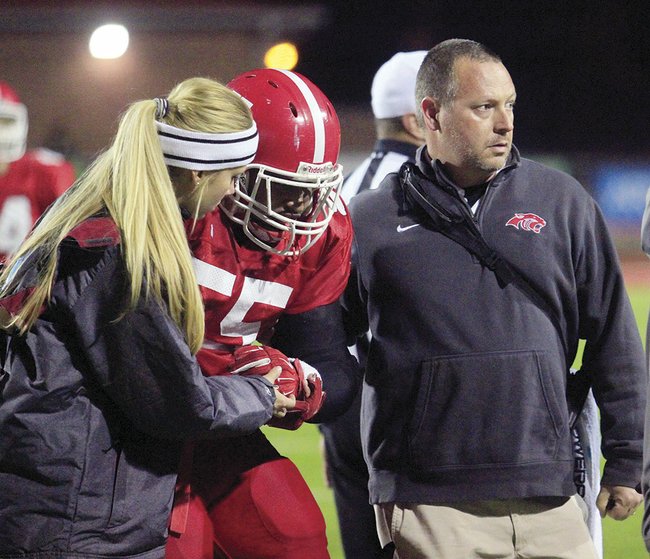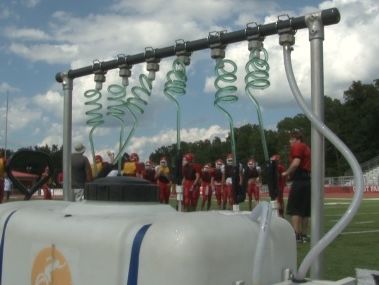
Jason Cates had dreams of playing college football at Arkansas State University in Jonesboro after finishing his playing days as a Red Devil at Jacksonville High School.
However, a motorcycle accident changed those plans and led him to his current career path as an athletic trainer. And now he is the head athletic trainer for the Cabot School District.
“I had a motorcycle wreck my senior year [1992] the Friday we got out for spring break,” Cates said. “I spent all summer long trying to rehab and get well. I was going to go to ASU and walk on the football team. That never materialized because of those injuries.”
Cates said he spoke with his classmate Mike Gilboe and the head athletic trainer at ASU, Ron Carroll, and sports medicine intrigued him. Arkansas State University was the first school in Arkansas with a fully-accredited sports medicine program.
“The more I hung around and asked questions … and finally one day, Ron Carroll, the head athletic trainer was like ‘why don’t you do it. You seem interested in it.’ From there, he saw something in me that I didn’t see in myself,” Cates said, adding that Carroll took him under his wing and “mentored” him.
“It has afforded me opportunities that I never thought I would have in the profession,” Cates said. “Contacts through there have opened doors for me to work with Olympic athletes to professional athletes.”
After graduating from Arkansas State in 1996, Cates worked for Health South, a sports medicine conglomerate. “They were the Walmart of sports medicine,” Cates said.
Cates said he returned to central Arkansas in 2000, working for Arkansas Sports Medicine in Little Rock. Once he got back, Cates saw a void of sports medicine in the area’s secondary schools.
“At that time, six high schools in the state had athletic trainers,” he said. “It puzzled me — why do professional and high school athletes have these services when they are much more physically mature, but for athletes that are less physically mature and at a great risk for injuries, there is no one there to care for them on a day-to-day basis.
“Things weren’t moving in Arkansas like they were in other states. It really lagged behind [with sports medicine programs]. There were a few central Arkansas schools and a few in Northwest Arkansas.”
Cates said he put that situation in his “crosshairs” and started to promote and grow the sports medicine program for secondary schools.
“There were athletic trainers going around doing what I call ‘potato-chip routes,’ going around checking on two or three different schools, he said. “They would be on the sideline on Friday night. That is essentially putting a Band-aid on a fracture.”
Instead, for proper care, Cates said, “It’s the day-to-day contact. It’s being there to cover practices. Most injuries happen at practice. They don’t happen on Friday nights under the lights.”
While working with Arkansas Sports Medicine, Cates was working with the Arkansas Twisters arena football team and the Arkansas Riverblades minor league hockey team while also doing the “potato-chip route,” working with area high schools.
Cates said Arkansas Sports Medicine became part of Arkansas Specialty Orthopedics. At that time, Cates went to work at OrthoArkansas, another sports medicine-minded practice.
Then Cates went to work covering his alma mater of Jacksonville High School.
“I was working there as an outreach contract athletic trainer,” he said. “I also worked with two physicians in the clinics. From 1 o’clock on, I was out at Jacksonville ever day. I did that for 11 years.”
In the spring of 2011, Cates became aware that the Cabot School District was looking to hire a full-time athletic training staff. His wife, Stacy, is a teacher in the district. His twin daughters, Georgia and Genna, now 11, were students at Cabot. He and his wife also have a son, Quinn, 9.
“I was looking at opportunities to be employed by a school district,” Cates said. “I had always preached that the athletic trainer needed to work for a school district, because as an outsider at a clinic, there is only so much that you can do to get a school to buy into. You are employed by somebody else. When you start making policies and procedures, it’s not always easy to do that.”
Cabot Superintendent Tony Thurman said the school board gave approval to move forward with an athletic training program in the spring of 2011.
“This decision was based on having athletic trainers at the current time in a few sports, but they were volunteers,” Thurman said. “We knew we needed more intensive assistance with prevention and treatment of injuries and wanted to to add an athletic-training preparatory program to our medical academy.”
Thurman said the coaches at Cabot were put in a tough spot dealing with athletic-related injuries.
“We also knew that a strong athletic-training program would benefit from the expertise they [the trainers] could bring to our district,” he said.
Cates interviewed for similar positions at Bentonville High School and at Hickman High School in Columbia, Missouri, his wife’s hometown.
“I applied [at Cabot] just to see what would happen,” he said. “I was fortunate and got an interview. In the interview process, I started painting my picture of a high school program. I guess I did a good job. I sparked some interest in them.”
When Cates was hired, he came on board around the same time that former Arkansas State football coach Steve Roberts was hired as athletic director.
“He had a great knowledge of a sports-medicine program, not just one athletic trainer trying to run around with their hair on fire covering everything,” Cates said. “We talked to him and talked about employing multiple athletic trainers and also doing the sports medicine curriculum. The administration bought into it 100 percent. I can’t say enough good things about what the administration has done and how they have put athletic health care on the front burner and kept that pot hot to make sure we have what we need to do the job we need to do.”
Cabot Schools currently has 16 sports with 81 teams and 1,200 athletes ranging from junior high through high school.
“It’s a daunting task to care for those kids on a day-to-day basis,” Cates said. “The administration has supported us 100 percent.”
Cabot’s current training staff includes full-time trainers Cates and Jennifer Asberry and sports medicine teachers Lyndsey Rich and Hollie Whittaker, who also cover sports when not in class.
Roberts said that Cates has done a “tremendous job” in building the athletic-training program at Cabot.
“He’s a tireless worker who has nothing but the best interests of the student-athletes in mind in every decision and every action that he takes,” Roberts said.
Cates said coming to Cabot was a no-brainer.
“People will say that Bentonville and Hickman are bigger, but I feel like we have built something special here to where now other schools in the state and the region are coming here to find out what we do and how they can mimic that,” he said.
Also, Cates said he enjoys the small-town feel of Cabot.
“If you need something, it doesn’t take asking more than one or two people and they will help get it done,” he said. “The school is the hub and the heart of a community. Everyone here is very involved and very interested in wanting things to go right. If the school is successful, then the community is successful. That is something that can’t be understated.”
Cates has concurrently been involved in community-minded committees and activities outside of the Cabot School District.
Thurman said the district is proud of what Cates has done in his time at Cabot.
“Mr. Cates has worked and has been the leader of our program and he has taken the program well beyond our initial objectives for starting the program,” Thurman said. “He represents Cabot at numerous state and national seminars, sharing the keys to an effective and comprehensive athletic-training program. His expertise and guidance in helping school districts work with first responders to develop comprehensive emergency-action plans is exemplary.”
He is a past president of the Arkansas Athletic Trainers Association, currently the chairman of the Arkansas Activities Association Sports Medicine Advisory Committee and the new chairman of the secondary-schools committee of District 6 for the National Athletic Trainers Association. District 6 is comprised of Arkansas and Texas. He also serves on the NATA secondary-schools committee.
“We are proud, knowing that thanks to Mr. Jason Cates, our student-athletes are being provided with a very high level of injury prevention and care,” Thurman said.
Staff writer Mark Buffalo can be reached at (501) 399-3676 or mbuffalo@arkansasonline.com.
None Mark Buffalo can be reached at 501-399-3676 or mbuffalo@arkansasonline.com.
ORIGINAL ARTICLE:
http://www.arkansasonline.com/news/2015/dec/20/motorcycle-accident-points-cabot-trainer-down-anot/?f=threerivers
